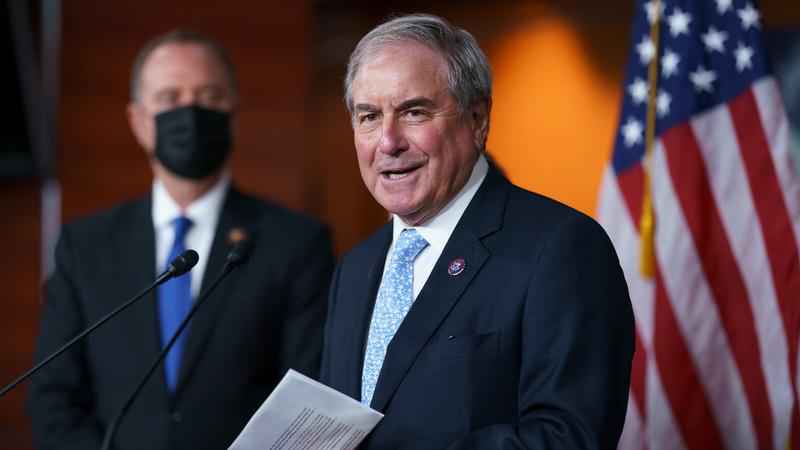Panel debates Dems’ $3.5T bill, crunch time for Biden agenda

In this Sept. 21, 2021, file photo House Budget Committee Chair John Yarmuth, D-Ky., joined at left by House Intelligence Committee Chairman Adam Schiff, D-Calif., talks to reporters at the Capitol in Washington.[J. Scott Applewhite/Associated Press]
Democrats pushed a $3.5 trillion, 10-year bill strengthening social safety net and climate programs toward House Budget Committee approval Saturday, while party leaders hunted behind the scenes for compromises to resolve internal divisions and, they hoped, allow the sprawling package’s eventual passage by Congress.
Approval by the Democratic-dominated panel, meeting virtually, was assured. Passage would mark a necessary but minor checking of a procedural box for Democrats by edging it a step closer to debate by the full House. Under budget rules, the committee wasn’t even allowed to significantly amend the 2,465-page measure, the product of 13 other House committees.
The more important work has been happening in an opaque procession of mostly unannounced phone calls, meetings and other bargaining sessions among party leaders and rank-and-file lawmakers.
President Joe Biden, House Speaker Nancy Pelosi, D-Calif., and Senate Majority Leader Chuck Schumer, D-N.Y., must resolve differences among Democrats over the package’s final price tag, which seems sure to shrink. There are also disputes over which of its initiatives should be reshaped, among them expanded Medicare, tax breaks for children and health care, a push toward cleaner energy and higher levies on the rich and corporations.
Democrats’ wafer-thin majorities in the House and Senate mean compromise is mandatory. Before the measure the Budget panel considered Saturday even reaches the House floor — the timing is uncertain — it is expected to be changed to reflect whatever House-Senate accords have been reached, and additional revisions are likely.
The overall bill embodies the crux of Biden’s top domestic goals. Budget panel chairman John Yarmuth, D-Ky., cited “decades of disinvestment” on needs like health care, education, child care and the environment as the rationale for the legislation.
“The futures of millions of Americans and their families are at stake. We can no longer afford the costs of neglect and inaction. The time to act is now," Yarmuth said.
Republicans say the proposal is unneeded, unaffordable amid accumulated federal debt exceeding $28 trillion and reflects Democrats’ drive to insert government into people’s lives. Its tax boosts will cost jobs and include credits for buying electric vehicles, purchases often made by people with comfortable incomes, they said.
“This bill is a disaster for working-class families,” said Rep. Jason Smith of Missouri, the committee’s top Republican. “It’s a big giveaway to the wealthy, it’s a laundry list of agenda items pulled right out of the Bernie Sanders socialist playbook.”
The unusual weekend session occurred as top Democrats amp up efforts to end increasingly bitter disputes between the party’s centrist and progressive wings that threaten to undermine Biden’s agenda.
Biden conceded Friday that talks among Democrats were at a “stalemate,” though Pelosi and Schumer have been more positive in an apparent effort to build momentum and soothe differences. A collapse of the measure at his own party’s hands would be a wounding preview to the coming election year, in which House and Senate control are at stake.
To nail down moderates’ support for an earlier budget blueprint, Pelosi promised to begin House consideration by Monday of another pillar of Biden’s domestic plans: a $1 trillion collection of roadway and other infrastructure projects. Pelosi reaffirmed this week that the infrastructure debate would begin Monday.
But many moderates who consider the infrastructure bill their top goal also want to cut the $3.5 trillion social and environment package and trim or reshape some of its programs. Sens. Joe Manchin, D-W.Va., and Kyrsten Sinema, D-Ariz., have been among the most visible centrists demanding a smaller price tag.
In response, progressives — their top priority is the $3.5 trillion measure — are threatening to vote against the infrastructure bill should it come up for a vote this week. Their opposition seems likely to be enough to scuttle it, and Pelosi hasn’t definitively said when a vote on final passage of the infrastructure measure will occur.
With each portion of the party threatening to upend the other’s most cherished goal — a political disaster in the making for Democrats — top Democrats are using the moment to accelerate talks on the massive social and climate legislation. Compromise is a requirement, because the party can lose no votes in the Senate and a maximum of three in the House to succeed in the narrowly split Congress.
Biden met with over 20 congressional Democrats this week, and White House press secretary Jen Psaki said such meetings would continue next week.